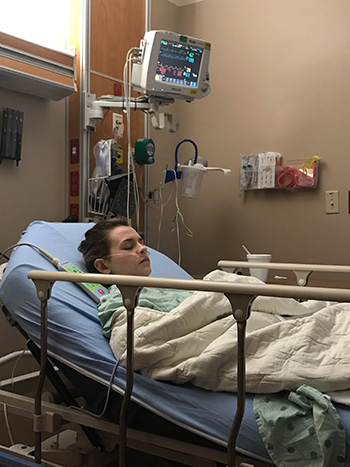2.127 seconds. That’s how long it took mediKanren to find 347 possible treatments for nausea. 2.127 seconds that helped bring relief to a young woman who has been throwing up all her life.
 The team has working knowledge of medicine, biology, computer science, chemistry and anatomy, with a healthy dose of Sherlock Holmes thrown in.MediKanren is an artificial intelligence agent developed by a team of researchers at the Hugh Kaul Precision Medicine Institute at the University of Alabama at Birmingham School of Medicine. Led by institute director Matt Might, Ph.D., a computer scientist by training, the team has fed mediKanren every paper ever published in the medical literature.
The team has working knowledge of medicine, biology, computer science, chemistry and anatomy, with a healthy dose of Sherlock Holmes thrown in.MediKanren is an artificial intelligence agent developed by a team of researchers at the Hugh Kaul Precision Medicine Institute at the University of Alabama at Birmingham School of Medicine. Led by institute director Matt Might, Ph.D., a computer scientist by training, the team has fed mediKanren every paper ever published in the medical literature.
“It’s a logical, deductive reasoning system,” Might said. “You ask it a question, and it scans all the literature before presenting you with a list of findings. It learns as it goes, so the more information it processes, the more accurate its suggestions become. We had a patient with what we suspected was cyclical vomiting syndrome. In just over two seconds, it looked at all the literature pertaining to the symptoms we fed it and came back with recommendations for treatment.”
Might’s team at the Precision Medicine Institute were able to whittle the 347 possible treatments down to four or five that seemed most promising, based on mediKanren’s analysis and their own diagnostic sleuthing skills. The team has working knowledge of medicine, biology, computer science, chemistry and anatomy, with a healthy dose of Sherlock Holmes thrown in.
Kelsea’s story
The patient is a young woman named Kelsea Rodriguiz. She has been dealing with nausea and vomiting for as long as she can remember.
 Kelsea was frequently hospitalized, often every month.“The vomiting started when I was really young,” she said. “I had severe stomach cramps and nausea. I can’t recall a time when I wasn’t having issues every day.”
Kelsea was frequently hospitalized, often every month.“The vomiting started when I was really young,” she said. “I had severe stomach cramps and nausea. I can’t recall a time when I wasn’t having issues every day.”
Issues that got worse when she hit puberty. Beginning a menstrual cycle brought on more vomiting and more nausea, often leading to a trip to a hospital emergency room as she was suffering from dehydration.
“I would have to go to an ER almost every month,” Kelsea said. “No one really understood what was wrong with me. They said I was just a hormonal teenager, that I couldn’t handle pain, that I was having panic attacks. Some accused me of just wanting to be on birth control and that I was a hopeless case.”
Her teen years were tough. At the lowest point, she weighed just 77 pounds.
“I would just cry my eyes out because I couldn’t do what any normal teenager could do,” she said.
Help came from UAB’s Precision Medicine Institute. It was established by the University of Alabama Board of Trustees in 2016 and Might was hired as the inaugural director in February 2017, following a two-year stint with the Obama White House’s Precision Medicine Initiative. Kelsea’s father works for a biotechnology company familiar with Might and the university’s work in precision medicine, and turned to UAB as a last resort.
“We talked with Kelsea and her parents and loaded all the information they provided into mediKanren,” Might said. “Beyond scanning the literature, it also uses its deductive reasoning ability to offer explanations for why it makes certain suggestions.”
Start with isopropyl alcohol
In this case, mediKanren’s suggestions were for symptom control. Top of the list was isopropyl alcohol, the stuff found in hand sanitizer and rubbing alcohol.
“There were a couple of fairly obscure papers from research groups in South America that said isopropyl alcohol had an effect on nausea,” Might said. “MediKanren found those and placed them at the top of our list.”
The other recommendations were similarly low-tech. Hot baths, warm compresses and antihistamines such as Benadryl or Periactin.
“We gave Kelsea those recommendations and she reported that they worked,” Might said. “Her issues were dramatically reduced, which led us to wonder why they worked.”
Looking deeper, the Precision Medicine team found that, in animal models, overexpression of a gene called FOS led to nausea. There are studies suggesting that isopropyl alcohol reduces the expression of FOS, giving Might confidence that there was a plausible scientific basis behind the recommendation.
“No physician can know everything, just as no one can possibly read and retain every scientific paper in the medical literature,” Might said. “What mediKanren does is support the physician with novel facts of which they might not be aware. It provides some clinical insight, which can be essential.”Kelsea also had migraine headaches, leading the UAB team to wonder if she also had what is known as abdominal migraine, a phenomena described as a migraine in the stomach. MediKanren found studies suggesting hot baths and antihistamines as therapies for abdominal migraine.
 Jeremy and Kelsea are stationed at the U.S. naval base in San Diego.Success
Jeremy and Kelsea are stationed at the U.S. naval base in San Diego.Success
Kelsea embraced these simple but intriguing options.
“They offered these tiny solutions that seemed so minor,” she said. “I was desperate and willing to try anything. And they worked.”
She now carries hand wipes containing isopropyl alcohol with her and breathes through them whenever she feels nauseated. After hearing about abdominal migraine, she realized that her nausea often came the day after a migraine headache. Heating pads and hot baths help with that.
“I was able to recognize what my triggers are, and take steps to minimize them,” Kelsea said. “Certain foods are triggers, so I avoid those, especially at vulnerable times. I have kits everywhere in the house, car and my purse containing Benadryl and hand wipes, which help to quickly stop an episode as soon as I feel it coming on.”
Bottom line? Life has become much more normal for Kelsea. Able to eat more, she has gained weight, to a healthy 117 pounds. And best of all, she got married.
“Jeremy was a close friend who visited every time I was in a hospital,” she said. “We finally realized that we were more than friends and got together a few months ago.”
Now in San Diego, where Jeremy is stationed in the Navy, Kelsea is concentrating on completing her oft-interrupted education and exploring a passion for art. Her episodes have not ended, but she can manage them now that she understands the triggers and has the tools suggested by the Precision Medicine team.
| “I would have to go to an ER almost every month. No one really understood what was wrong with me. They said I was just a hormonal teenager, that I couldn’t handle pain, that I was having panic attacks. Some accused me of just wanting to be on birth control and that I was a hopeless case.” |
“I battled these issues for so long, and it was so hard to get help,” Kelsea said. “I’m so thankful for what Dr. Might and the Precision Medicine Institute were able to do for me. I’m excited to tell others, because to be able to help even one person would put my mind at peace.”
The institute is a leader in the burgeoning field of precision medicine. Its primary focus areas include diagnosing rare diseases, pharmacogenomics and treating cancer by providing cutting-edge treatments based on the genetic profile of individual tumors. For more information on precision medicine at UAB, visit UAB Medicine.